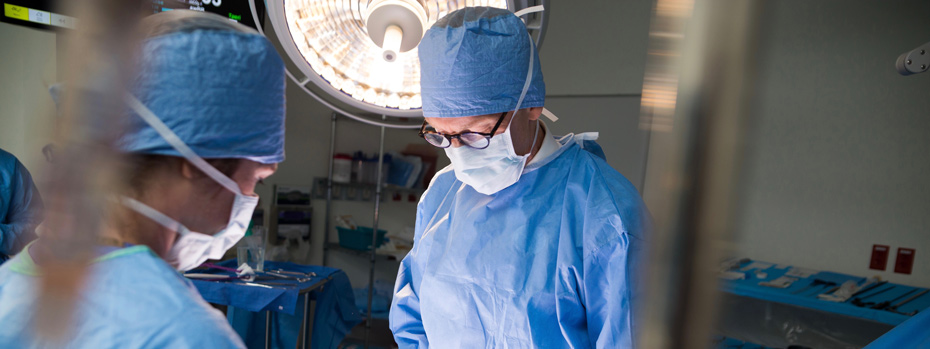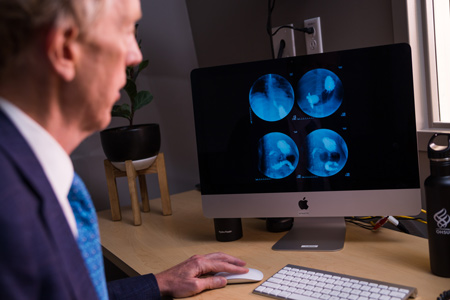Esophageal Cancer Diagnosis and Treatment

Esophageal cancer is a complex illness that requires specialized care. At the OHSU Knight Cancer Institute, our expertise attracts patients from across Oregon and beyond. You’ll find:
- Highly skilled doctors who focus on esophageal cancer. They understand every aspect of diagnosis and treatment.
- A team approach, including regular meetings where specialists combine their expertise one patient at a time.
- Innovative treatments, including surgery pioneered at OHSU.
- Precise diagnostic testing so you can be confident in your results.
- A wide range of support services for you and your family.
Esophageal cancer diagnosis
We offer the latest tests, including:
- Upper endoscopy/biopsy: We guide a flexible tube (endoscope) with a camera and tiny tools down your throat. It enables us to look at your esophagus and, if needed, to take a small tissue sample (biopsy) to examine under a microscope. Our doctors have special training for a high degree of accuracy.
- CT scan: A computed tomography scan uses an X-ray beam that circles the body to create detailed 3D images. This helps us understand the shape, size, and location of the tumor.
- PET/CT scan: This scan combines CT imaging with a positron emission tomography scan. In a PET scan, a small amount of radioactive sugar is injected into your bloodstream. Cancer cells use more of the sugar, making them light up on the scan. This is very effective at finding out if the tumor has spread.
- Endoscopic ultrasound: A small device is guided into the esophagus to generate sound waves and produce high-definition images. We do hundreds of these procedures a year, giving us exceptional precision. This helps us understand how deeply the tumor has invaded the esophagus and nearby lymph nodes.

Esophageal cancer treatment
Treatment depends on several factors, including the stage of your cancer.
For early-stage tumors, we recommend endoscopic mucosal resection.
For more advanced tumors, we recommend treatment that combines several types of therapy, such as:
- Chemotherapy
- Targeted therapy
- Immunotherapy
- Radiation therapy
- Surgery
Endoscopic mucosal resection
Endoscopic mucosal resection (EMR) is surgery to treat early-stage tumors. The mucosa is a layer of cells that line the inside of the esophagus, sort of like an inner tube for a bicycle wheel.
If the tumor has not reached below the mucosal layer, doctors may be able to remove it with an endoscope. This is a flexible tube equipped with cameras and surgical tools. The endoscope is guided through your mouth and into your esophagus. We do hundreds of EMRs a year with exceptional accuracy and low rates of complications.
Chemotherapy
Chemotherapy uses drugs to attack cancer cells. It is typically given in an IV infusion (slow drip). Our community cancer clinics, with five Portland-area locations, bring your treatment closer to home.
For esophageal cancer, we usually combine chemotherapy and radiation therapy. These therapies are more effective together in a combination called chemoradiation. The goal is to shrink the tumor as much as possible before surgery.
Targeted therapy
Targeted therapy uses drugs that have been engineered to home in on cancer cells, leaving healthy cells mostly unharmed. For example, some esophageal cancers generate too much of a protein called HER2, which signals cancer cells to grow. A targeted therapy called Herceptin, given by IV, can block HER2.
Immunotherapy
Immunotherapy harnesses the immune system to hunt down and destroy cancer cells. One medication, given by IV, can shrink or slow tumors of the gastroesophageal junction, where the stomach and esophagus meet. Research suggests that some patients benefit from immunotherapy. We are conducting a clinical trial to see if immunotherapy can help more patients.
Radiation therapy
Doctors aim beams of energy at the precise location of your cancer. Our advanced technology enables us to track the tumor during treatment and adjust for slight movements from breathing. We offer:
- 3D conformal radiation therapy: We direct radiation beams to match the exact shape and location of your tumor. This allows us to use a higher dose without harming healthy cells.
- Intensity-modulated radiation therapy: This is a type of 3D conformal radiation therapy. It enables us to vary the intensity to different parts of the tumor, lowering the risk of side effects.
For esophageal cancer, we often combine radiation therapy with chemotherapy in a therapy called chemoradiation.
Esophagectomy
Esophagectomy is surgery to remove cancer that has invaded the deeper layers of the esophagus. This surgery usually comes after you have received chemotherapy and radiation therapy.
We do this surgery with techniques developed at OHSU by Dr. John Hunter. In minimally invasive esophagectomy, we use long instruments to remove the esophagus and lymph nodes through small incisions. This leads to better outcomes, less pain and faster recovery than open surgery. We usually borrow a section of the stomach to replace the esophagus. We have one of the most experienced esophagectomy teams in the nation.
Esophagectomy is major surgery. It takes most patients six to eight weeks to recover. We provide follow-up care to support you through recovery.
Clinical trials
Researchers around the world are working to better understand esophageal cancer. We are running several clinical trials to improve our knowledge and help more patients.
Care for the whole person
Esophageal cancer is a serious and complex condition. We offer a full menu of services to help you and your family, including:
- Acupuncture: This alternative therapy can help you manage symptoms and side effects.
- Palliative care: Our palliative care team can help ease anxiety and symptoms. Services are available at any stage of treatment.
- Nutrition: Our cancer dietitians can help you manage nutrition before, during and after treatment. They can also help with trouble eating or drinking.
- Esophageal cancer registry: Our cancer registries help researchers search for better ways to detect and treat cancer. Learn how you can take part.
Learn more
- Treating Esophagus Cancer, American Cancer Society
- Esophageal Cancer Treatment, National Cancer Institute
- After an Esophageal Cancer Diagnosis, CancerCare
- How to Treat & Beat EC, Esophageal Cancer Awareness Association
- Living as an Esophagus Cancer Survivor, American Cancer Society
Location
Knight Cancer Institute, South Waterfront
Center for Health & Healing, Building 2
3485 S. Bond Ave.
Portland, OR 97239
Free parking for patients and visitors
Refer a patient
- Refer your patient to OHSU.
- Call 503-494-4567 to seek provider-to-provider advice.
Read more
Learn more about OHSU Knight Cancer Institute treatments: